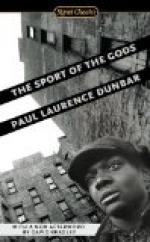Joe and Kit were differently affected by what they saw about them. The boy was wild with enthusiasm and with a desire to be a part of all that the metropolis meant. In the evening he saw the young fellows passing by dressed in their spruce clothes, and he wondered with a sort of envy where they could be going. Back home there had been no place much worth going to, except church and one or two people’s houses. But these young fellows seemed to show by their manners that they were neither going to church nor a family visiting. In the moment that he recognised this, a revelation came to him,—the knowledge that his horizon had been very narrow, and he felt angry that it was so. Why should those fellows be different from him? Why should they walk the streets so knowingly, so independently, when he knew not whither to turn his steps? Well, he was in New York, and now he would learn. Some day some greenhorn from the South should stand at a window and look out envying him, as he passed, red-cravated, patent-leathered, intent on some goal. Was it not better, after all, that circumstances had forced them thither? Had it not been so, they might all have stayed home and stagnated. Well, thought he, it ’s an ill wind that blows nobody good, and somehow, with a guilty under-thought, he forgot to feel the natural pity for his father, toiling guiltless in the prison of his native State.
Whom the Gods wish to destroy they first make mad. The first sign of the demoralisation of the provincial who comes to New York is his pride at his insensibility to certain impressions which used to influence him at home. First, he begins to scoff, and there is no truth in his views nor depth in his laugh. But by and by, from mere pretending, it becomes real. He grows callous. After that he goes to the devil very cheerfully.
No such radical emotions, however, troubled Kit’s mind. She too stood at the windows and looked down into the street. There was a sort of complacent calm in the manner in which she viewed the girls’ hats and dresses. Many of them were really pretty, she told herself, but for the most part they were not better than what she had had down home. There was a sound quality in the girl’s make-up that helped her to see through the glamour of mere place and recognise worth for itself. Or it may have been the critical faculty, which is prominent in most women, that kept her from thinking a five-cent cheese-cloth any better in New York than it was at home. She had a certain self-respect which made her value herself and her own traditions higher than her brother did his.
When later in the evening the porter who had been kind to them came in and was introduced as Mr. William Thomas, young as she was, she took his open admiration for her with more coolness than Joe exhibited when Thomas offered to show him something of the town some day or night.
Mr. Thomas was a loquacious little man with a confident air born of an intense admiration of himself. He was the idol of a number of servant-girls’ hearts, and altogether a decidedly dashing back-area-way Don Juan.




